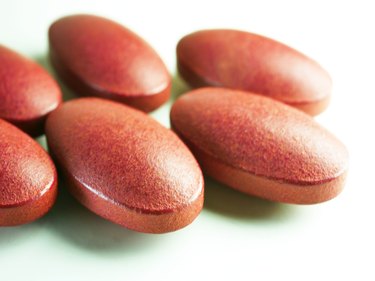
If you often get fungal infections like yeast infections or oral thrush, you may be wondering if dietary iron overload can cause or worsen a yeast infection, or if low iron can affect oral thrush. Sorting through all the contradictory dietary advice can be daunting. Here's what you need to know.
Video of the Day
Video of the Day
Fungus, Yeast and Candida
A yeast infection is a type of fungal infection, as yeast are a type of fungus, according to the Centers for Disease Control and Prevention (CDC). One specific yeast, known as Candida, can sometimes grow out of control, usually in the mouth or vagina, causing a condition known as candidiasis.
Candidiasis in the vagina has the more common name "vaginal yeast infection," per the CDC, whereas candidiasis in your mouth or throat is commonly called "oral thrush," according to the Mayo Clinic.
Normally, Candida fungus, a normal part of your mucous membranes, is kept under control by the healthy bacteria that live in and on your body and by your immune system, according to the CDC. But if the mix of native bacteria is altered by a course of antibiotics, contraceptives, corticosteroids, other conditions or a weakened immune system, an overgrowth of Candida may occur. Telltale outward signs are irritation, white patches inside the mouth or throat or thick, white vaginal discharge.
The Role of Iron in Fungal Infections
The reason you may have heard about iron in relation to yeast infection is because this dietary mineral is needed for cellular growth, including the growth of yeast cells, says Kristi King, MPH, RDN, a Houston-based spokesperson for the Academy of Nutrition & Dietetics and a senior pediatric dietitian at Texas Children's Hospital.
"Yeast can become a scavenger looking for that iron [so] that it can continue to grow," she says.
However, it's not as straightforward as lower iron being good and higher iron being bad. "Yeast has developed a navigation system to thrive in a body that is low in iron, as well as a body that has high iron stores," King says.
Don't Restrict Iron
It's possible to get too little iron. Iron-deficiency symptoms can include debilitating fatigue and weakness, so it's important not to restrict your intake, according to the Office on Women's Health (OWH).
Per the OWH, good iron sources include:
- Fortified breakfast cereals
- Oysters
- Beans (white beans, red kidney beans)
- Dark chocolate
- Beef liver
- Spinach
That said, if you are prone to yeast infections, do not take extra iron in supplements unless you have been especially advised to do so by a health professional, King says. "Your medical team will know whether the benefits of an iron supplement might outweigh the potential risk in your case," she says.
Fighting Yeast Infections and Oral Thrush With Diet
"For combating yeast infections, aim for high-quality proteins and non-starchy vegetables, incorporate healthy omega-3 fats and, of course, drink plenty of water," King says. "Eating a varied diet that is low in added and refined sugars will also be helpful."
And besides the more obvious sugary foods like desserts and full-sugar fizzy drinks, King says to avoid higher-sugar fruits such as mango, kiwi and grapes, which might also worsen a yeast infection.
"In addition, you want to avoid foods that are made with yeast such as bread and other leavened baked goods, as well as beer and malt liquors, soy sauce and even kombucha," King says.
An October 2019 meta-analysis in Nutrients found that taking a probiotic could be helpful for oral candidiasis, especially in people who wear dentures. However, due to the inclusion of some studies that were not of the highest quality, the authors also stated the results should be taken with a grain of salt.
"A probiotic may be helpful," King says, "but I encourage you to discuss with your health provider prior to taking to ensure it is right for you."
Read more: What Kinds of Fruits Are in the Candida Diet?
- Centers for Disease Control and Prevention: “Candidiasis”
- Centers for Disease Control and Prevention: “Vaginal Candidiasis”
- Mayo Clinic: “Oral Thrush: Symptoms & Causes”
- Kristi King, MPH, RDN, LD, CNSC, senior pediatric dietitian, Texas Children's Hospital; clinical instructor, Baylor College of Medicine; national spokesperson, Academy of Nutrition & Dietetics; Houston
- Office on Women’s Health: “Iron-Deficiency Anemia”
- Nutrients: “Effect of Probiotics on Oral Candidiasis: A Systematic Review and Meta-Analysis”
Is this an emergency? If you are experiencing serious medical symptoms, please see the National Library of Medicine’s list of signs you need emergency medical attention or call 911.